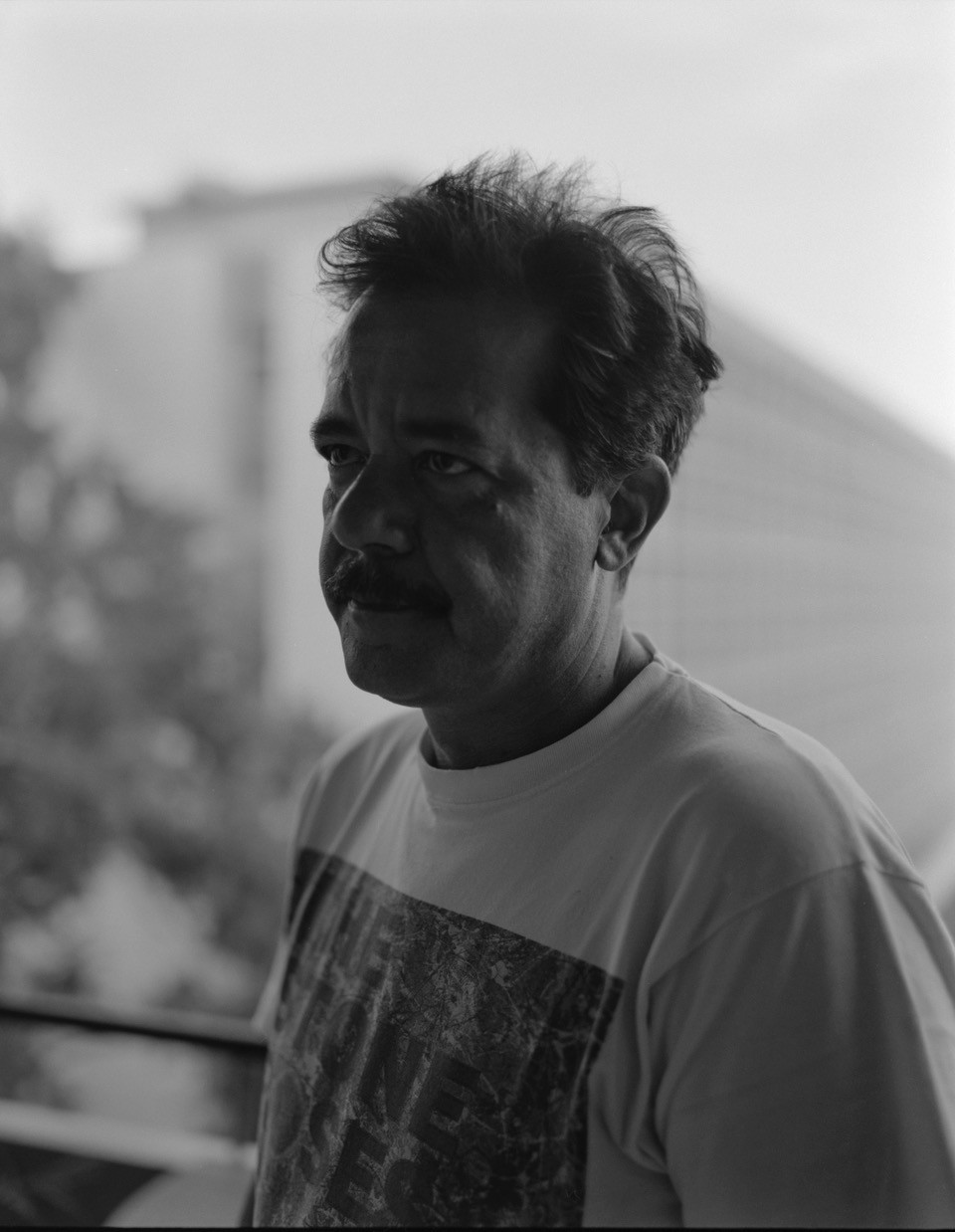
Efthimis Filippou is the co-writer behind most of Yorgos Lanthimos’s films—from Dogtooth (2009) to Kinds of Kindness (2024)—as well as an accomplished author and playwright in Greece. Here, he speaks about his writing process in his own words. Photography by Yorgos Lanthimos.
Efthimis Filippou was born in 1977, a period after the military dictatorship, and on the eve of Greece’s membership to what is today known as the European Union. As the country’s most accomplished modern screenwriter and playwright, he came of age in periods of hope, turmoil, and political chaos. Modern Greece was a fertile setting to inspire the surrealism that haunts much of Filippou’s writing, and after a career as an advertising copywriter, he published a series of books, plays, and screenplays that contributed to the popularity of what is known as the “Greek Weird Wave”—most famously with his collaborator, the filmmaker Yorgos Lanthimos, who he co-wrote with on Dogtooth (2009), The Lobster (2015), and most recently Kinds of Kindness (2024). Many consider Filippou to be just as important to Lanthimos’ cinematic vision. But while Hollywood has beckoned, he remains interested in dissecting the political tragedies of Greece. His play Etymologies (2020 – 2024), recently staged in the Old Parliament House—in partnership with the actress Angeliki Papoulia—observes how language is used to distinguish between lies and truth. Like much of his work, there is an underlying, not immediately obvious, political commentary that is communicated in a subversive and thrilling way. With the release of Etymologies, and ahead of co-writing again with Lanthimos, he shares his thoughts with us from his desk in Athens—in his own words.
There was never such a moment, sadly. I don’t fall into that category of people who connect to their work out of a certain “need.” For me what worked was luck, and meeting Yorgos Lanthimos. That’s how it all began. Even today, when someone asks me what it is I do, I’m unlikely to answer “writer” or “screenwriter.” And that’s not me being shy or modest because I’ve caught myself being shameless many a time. Maybe it’s just not sunk in yet, as an occupation that defines me completely.
My father died two months before I was born, so my childhood was filled with pity. The fact I’d never met him made things far easier for me, as I never felt his loss as deeply as my mother or his parents did. That being said, I sensed I was expected to take on the role of an orphaned child, one who was sad about it too, and that immediately made others take an instinctive liking to me. The words “death”, “father”, “son”, and so on, when used in the right sentences, instantly charged exchanges with a certain atmosphere, and while my motives back then may have been to get a little pocket money or a pizza or an ice cream, the power was there all the same and made things easier—that was probably the first time I started using this power.
I don’t read all that much and I think I’m more influenced by the people I observe than I am by characters in stories. What really interests me is listening and looking at the people around me, both people I know and people I don’t—I’m interested in their clothes, their phone cases, their ringtones, their hair, their nails, their socks, that sort of thing. And the words they use, or even the ones they avoid using. Songs have influenced me a lot too—song lyrics.
There’s no routine other than I like my desk to be tidy before I start writing and that I wear shoes, but that’s about it. Beyond that, I try to remind myself that what I do is a job like any other, and that that’s how I ought to approach it. I have to deliver something, so I have to write. Whether it’s morning or night. Whether I’m at the office or not.
It’s never my intention to declare something or to court some opinion— however much I like symbolism, I dislike it twice as much. With each work, my aim is to try and describe a certain time, a certain place, and certain behaviours. Now if all this makes someone think of the European Union or the immigration debate or the Greek Civil War then I’m really very glad but that’s never how my own writing starts.
The life a person has lived is their core influence and countries are a part of life, so yes, Greece, my mum, my granddad, and the islands have all influenced my stories. Whenever I write, I’m not thinking about ice and rain, I’m more likely thinking of the sun and sea. I try not to talk about Greek themes but what I imagine when I write is totally Greek. The dialogue is in Greek too.
I can’t compare my mother tongue to any other language as it’s the only one I really know. My English is good enough to get by on but too limited to really describe things. Generally, as the years go by, I’m more drawn to simple words and detest words that are difficult and obscure and high-flown. In any language.
Happily, there’s the translator Kyriacos Karseras. We have a connection and collaboration going back many years. Kyriacos knows exactly how to translate the texts he gets given and I’m doubly glad because he also acts as an editor—I’m incapable of organising myself. I write rough drafts, make mistakes, don’t add any accents (yes, the Greek language has accents) and then Kyriacos, who has all these enzymes I lack, makes my texts seem regular and look professional, makes them readable. If anyone wants to read them, that is.
Because I admire her immensely as an actor and because we’re friends. Because we share similar opinions when it comes to what’s lovely and what’s horrible. Because she has this way of making everything easier when we’re working. Because, after all these years, we can be honest with each other, without wasting any time or energy. And because she brings to mind lots of lovely things that have happened over the years, which is really very useful as you approach 50.
All of the above, adding only that beyond his work as an actor, I also admire him as a director. Working with him is like working with a family member. It’s like having a bakery shop with your brother or your father.

Efthimis Filippou. Photo by Yorgos Lanthimos





